
Octavio Paz Lozano was a Mexican poet and diplomat. For his body of work, he was awarded the 1977 Jerusalem Prize, the 1981 Miguel de Cervantes Prize, the 1982 Neustadt International Prize for Literature, and the 1990 Nobel Prize in Literature.

Ismail Kadare was an Albanian novelist, poet, essayist, screenwriter, and playwright. He was a leading international literary figure and intellectual. He focused on poetry until the publication of his first novel, The General of the Dead Army, which made him famous internationally.
Albanian literature stretches back to the Middle Ages and comprises those literary texts and works written in Albanian. It may also refer to literature written by Albanians in Albania, Kosovo and the Albanian diaspora particularly in Italy. Albanian occupies an independent branch within the Indo-European family and does not have any other closely related language. The origin of Albanian is not entirely known, but it may be a successor of the ancient Illyrian language.

Dritëro Agolli was an Albanian poet, writer and politician. He studied in Leningrad in the Soviet Union, and wrote primarily poetry, but also short stories, essays, plays, and novels. He was head of the League of Writers and Artists of Albania from 1973 until 1992. He was a leading figure in the Albanian Communist nomenklatura.
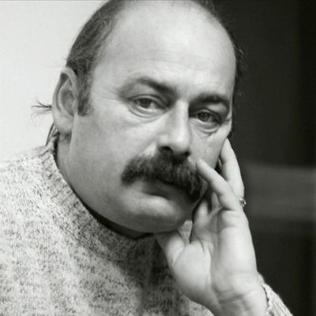
Teodor Keko was an Albanian writer, journalist, and politician.
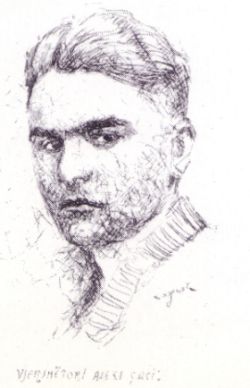
Aleks Çaçi was an Albanian author of the socialist realism period.
Ervin Hatibi is Albanian poet, essayist and painter. At the age of 14, Hatibi published his first poems in the literary pages of the main newspapers of the epoch. His first poetry collection Përditë Shoh Qiellin, Naim Frashëri, Tirana prefaced by Ismail Kadare, was published in 1989 when he was only 15 and was widely acclaimed by the critics of the communist regime. At that time, following the sudden fame of the young author and his grooming as future national poet of the communist state, the National Film Studios of Albania "Shqiperia e Re", produced a documentary film on his works, entitled "The 15 Year Old Poet".

Irma Kurti is a well-known Albanian poet, writer, lyricist, journalist and translator. She is a naturalized Italian citizen.
Fatos Arapi was an Albanian poet, short story writer, translator and journalist. Arapi's publications have been highly praised by his readers and his peers and have been awarded various national and international poetry prizes. In 2008 Arapi became the first Albanian poet to win the Golden Wreath Award.
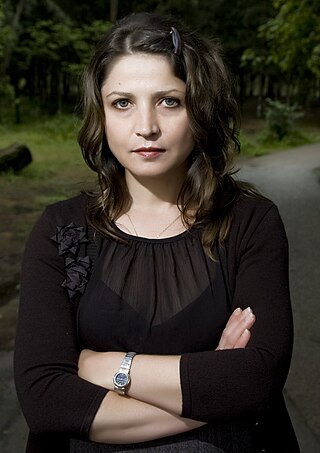
Luljeta Lleshanaku is an Albanian poet who is the recipient of the 2009 Crystal Vilenica award for European poets. She was educated in literature at the University of Tirana and was editor-in-chief of the weekly magazine Zëri i rinisë. She then worked for the literary newspaper Drita (Light). In 1996, she received the best book of the year award from the Eurorilindja Publishing House. In 1999, she took part in the International Writers Program at the University of Iowa. She is the author of four poetry collections, one volume of which has been translated into English: Fresco, available from New Directions. The writer, critic and editor Peter Constantine, in his introduction to Fresco, sums up her style in this way:
Luljeta Lleshanaku is a pioneer of Albanian poetry. She speaks with a completely original voice, her imagery and language always unexpected and innovative. Her poetry has little connection to poetic styles past or present in America, Europe, or the rest of the world. And it is not connected to anything in Albanian poetry either. We have in Lleshanaku a completely original poet."
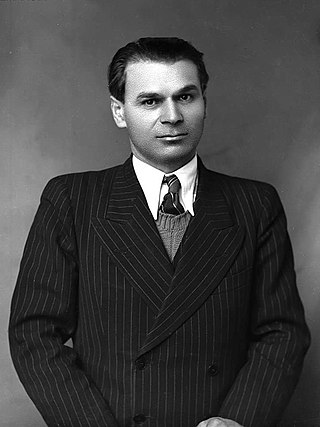
Llazar Sotir Gusho, commonly known by the pen name Lasgush Poradeci, was an Albanian philologist, poet, translator, writer and pioneer of modern Albanian literature. He is regarded as one of the most influential Albanian writers of the 20th century whose works are directly connected with Romanticism and Realism.
The League of Writers and Artists of Albania is a non-profit organization founded with the goal of promoting and advancing the literary and artistic creativity of Albanian writers and artists, as well as to assess and reassess the finest works of art in the following disciplines: music, painting, sculpture and literature. The organization actively promotes the originality and inventiveness of emerging young talents, while preserving Albanian traditional and modern values, in line with the best examples of literary and artistic values throughout the world.

Llazar Siliqi (1924–2001) was a notable Albanian poet. His poetic profile was influenced by the work of Mayakovsky.
Ram Krishna Singh is a reviewer, critic, and contemporary poet who writes in Indian English.
Faruk Myrtaj is an Albanian novelist, poet, translator and engineer. Myrtaj was born in a small mining town in Vlora. He was deprived the right for higher education (University) because of the communist regime, then in power. Only after 9 year was given to him the possibility to continue University, in the Mining Engineering Faculty of the University of Tirana, where he graduated in 1988.
Zenel Bastari or Zenel Hyka was an Albanian poet of the Bejtexhinj literary movement. A native of Tirana, he lived and worked from the end of 18th century until mid 19th century. Together with Hasan Zyko Kamberi and Nezim Frakulla he was part of the Bejtexhinj who focused on social and political criticism rather than Islamic moral and life. A precursor of the bourgeois critical-realism, he is also considered one of the first anti-feudal writers in Albania.
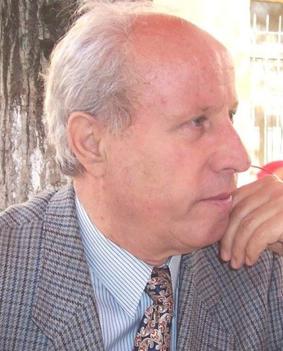
Petraq Zoto was an Albanian writer. He is mostly known for his collection of stories, and books targeting children and young readers.

Kadrush Radogoshi is an Albanian poet, novelist, play-writer, and literary critic from Kosovo. He is a dissident who opposed the revocation of the autonomy of Kosovo from the Milosevic's regime, consequently being arrested and imprisoned. Radogoshi served as President of Writers' Union of Kosovo. In 2010, he settled in Canada.
Bardhyl Londo was an Albanian poet and writer.










